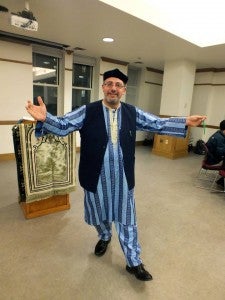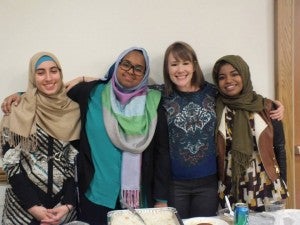Ashoorah: A Day of Reflection during the first month of the Islamic New Year
 This year I attended my first Ashoorah aftar at Georgetown. It was beautiful seeing families, students, and other members of the community gathering around tables and greeting each other with peace. The atmosphere was most welcoming and smelled of delicious food all of us were eager to break our fast with.
This year I attended my first Ashoorah aftar at Georgetown. It was beautiful seeing families, students, and other members of the community gathering around tables and greeting each other with peace. The atmosphere was most welcoming and smelled of delicious food all of us were eager to break our fast with.
After the call to prayer, men and women flocked to the prayer rugs to congregate for salah (prayer). Crammed together on a row of prayer mats, I felt I wasn’t alone. The physical proximity of the person standing to my right and left made me question what drew us all here today. Why did we all fast on the same day and decide to break fast with one another? What compelled me to greet others with peace and feel honored to be surrounded by their presence? These questions came to mind while we were led in prayer. It was a blessing from God to be surrounded by His creation who remembered Him together with one person’s voice leading them united in worship. But I felt at that moment my reflection failed to resonate with the states of chaos and atrocity in the Muslim world. How could people drift away from the peace and ease of the soul amidst this sense of unity amongst God’s creation?
The rest of the evening included great conversation and discussion on the importance of Ashoorah in the Islamic calendar. Imam Hendi gave a brief explanation on the importance of the day of Ashoorah within the context of Islamic history. He told us Ashoorah is a day of remembrance for Shi’ites and Sunnis that is commemorated each year through different customs. Imam then welcomed to the podium a respected Shi’ite brother who gave significant insight about what Ashoorah means to his community and the similarities between Sunnis and Shi’ites in their belief in the oneness of the All-Mighty God. Sohail’s speech was monumental in encouraging the audience to engage in more meaningful, productive, and insightful dialogue with the Shi’ite community. The constant negative and politicized irreconcilable differences between Shi’ites and Sunnis seemed to disappear with each word Sohail uttered. Students who came from all over the world who had never met a Shi’ite yet alone heard from their perspective approached Sohail with questions and engaged in meaningful conversation. Friendships and bonds were formed with no political agenda or incentives then loving and appreciating all of God’s creation. This beautiful sight reminded me of a hadith narrated by Abu Darda who said the Messenger of God, peace and blessings be upon him, said: On the Day of Qiyamah certain people will be raised by Allah (SWT) in such a manner that their faces will be illuminated and they will be seated upon thrones of pearls, envied by the people; they will neither be Messengers or Martyrs. A bedouin exclaimed: Describe them to us so that we may recognize them. He replied: Those who love each other for Allah’s sake, coming from diverse tribes and different places, they gather for the remembrance of Allah (Hadith riwayat Tabrani).
The fact that we all gathered together, Sunni and Shi’ite, in one room to remember God and His mercy to mankind incited a speck of hope for positive change in the Muslim ummah. Maybe one day we can turn to our brother and sister, Shi’ite or Sunni, and love them for the sake of Allah as one of His treasured and blessed creations. But any hope of this happening can only be through effective communication. Communication in a safe space free of prejudice, hate, and anger.  A means of discussion that strives to seek understanding and tolerance. Imam Hendi presented us with this proposition in a room full of individuals he believed were fully capable of taking a step in this direction. I really questioned myself that night. What had I done towards engaging the Sunni and Shi’ite community in meaningful intra-faith dialogue? Asking this question to myself made me realize whatever I believed I had done was simply not enough. I have unaccessed potential to become a vehicle for change. A voice of peace and social justice.
A means of discussion that strives to seek understanding and tolerance. Imam Hendi presented us with this proposition in a room full of individuals he believed were fully capable of taking a step in this direction. I really questioned myself that night. What had I done towards engaging the Sunni and Shi’ite community in meaningful intra-faith dialogue? Asking this question to myself made me realize whatever I believed I had done was simply not enough. I have unaccessed potential to become a vehicle for change. A voice of peace and social justice.
Khadija H. Mohamud , SFS ’17
- Tagged
- Muslim